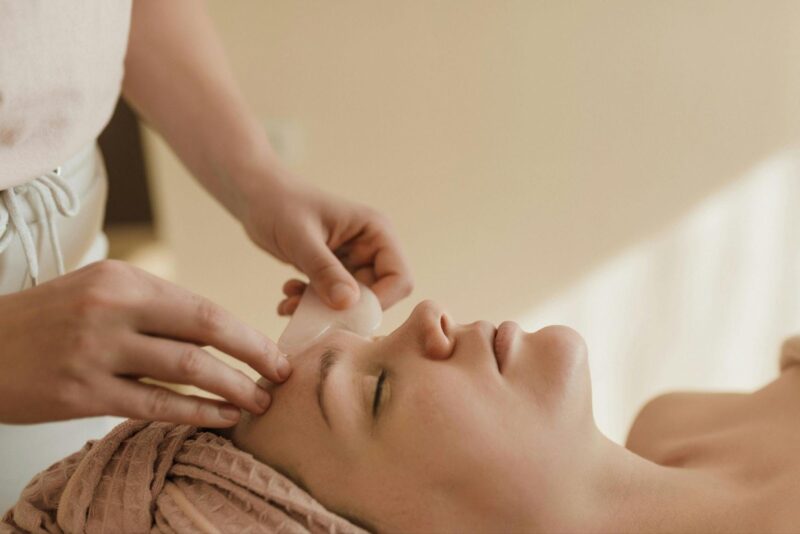
Many people wonder if certain skin changes can point to underlying health problems. Some skin symptoms can be early signs that a person may have polycystic ovary syndrome, also known as PCOS. Recognizing these changes can help individuals know when it’s time to seek medical advice. Click the link for natural healing for shingles.
Anyone noticing unusual or persistent skin issues may want to learn more about possible causes. For those curious about their symptoms, they can take an online PCOS quiz from Ubie or use an interactive symptom checker to explore whether PCOS might be a factor and discover potential next steps for care.
Acne On Face, Chest, And Back That Often Persists Beyond Teenage Years
One skin symptom that may suggest PCOS is acne. This acne often appears not only on the face but also on the chest and back. It is common for these breakouts to be more than just typical teenage pimples.
For many people with PCOS, the acne can last past the teenage years. Breakouts may be deeper and more painful compared to regular surface acne.
Hormone imbalances linked to PCOS can make the skin produce extra oil. This extra oil, combined with clogged pores, often causes acne.
Anyone with ongoing acne in these areas needs to speak with a healthcare provider. This can help find the cause and discuss treatment options.
Excessive Facial And Body Hair Growth (Hirsutism)
Hirsutism is when a person grows more dark or coarse hair on the face and body. This hair often appears in areas where men usually grow hair, such as the chin, upper lip, chest, or back.
This symptom can be one of the first things people notice if they have PCOS. The extra hair growth is linked to higher levels of androgens, which are hormones found in higher amounts in people with PCOS.
Some may find hair on the stomach, thighs, or lower back. The pattern and amount of hair growth can be different for everyone.

Hirsutism affects self-esteem and can be distressing. If someone sees these changes and is concerned, it’s a good idea to talk to a healthcare provider.
Oily Skin Leading To Frequent Breakouts
People with PCOS often notice their skin feels more oily than usual. This happens because PCOS can cause hormone levels to change, which makes the skin produce more oil.
The extra oil can clog pores. When this happens, it can lead to pimples and acne breakouts. These breakouts may appear on the face, chest, or back.
Oily skin and breakouts can start in the teenage years and sometimes last into adulthood. The acne linked to PCOS is often stubborn and may not clear with basic skin care.
PCOS-related acne usually shows up as red bumps, whiteheads, and sometimes painful cysts.
Dark, Velvety Patches Of Skin On The Neck, Armpits, Or Under The Breasts
Some people with PCOS notice dark, thickened areas of skin. These are often seen on the neck, under the arms, or beneath the breasts. The skin may feel soft and have a velvety texture.
This skin change is called acanthosis nigricans. It can look like brown or black patches that are different from the rest of the skin. These patches are not painful and do not itch, but they can be bothersome for some.

Acanthosis nigricans is sometimes linked to insulin resistance, which often happens in people with PCOS. If someone sees these patches, it may be a sign that their body is having trouble using insulin well.
Thinning Hair Or Hair Loss From The Scalp
People with PCOS can notice thinning hair or hair loss on the scalp. This hair loss usually happens at the top or front of the head and may start slowly. Over time, the hair becomes thinner or patchy, and the scalp can become more visible.
Higher levels of certain hormones can change the natural growth cycle of hair. These hormones may cause hair to fall out faster than usual. In some cases, hair loss can be one of the first signs of PCOS.
Hair thinning or bald spots may cause stress or lower self-confidence. Talking to a doctor about these changes can help find treatments or ways to manage symptoms. Treatments might aim to balance hormones and reduce hair loss linked to PCOS and are discussed in more detail in articles about PCOS and hair loss.
Conclusion
Skin symptoms like acne, oily skin, extra facial or body hair, and dark patches on the neck or underarms can point to PCOS. These signs often appear along with other changes in the body. Recognizing these changes early is helpful for getting the right care.
Anyone who notices these symptoms should talk with their doctor. Early diagnosis can help manage both skin and other health issues linked to PCOS.










